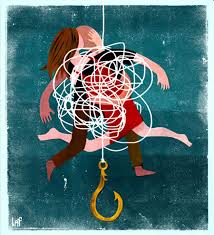Fourth Sunday in Ordinary Time
Deut. 18: 15-20; 1 Cor. 7: 32-35; Mk. 1: 21-28
Super Bowl Sunday!
It’s a day that rivets us Americans. Millions will gather around TV’s today for the sole purpose of watching a gigantic combat take place. And, depending on which team you favor, it’s our modern day version of the great battle of good vs. evil.
Which team will be seen as the stronger one, the more powerful one, the more worthy to be crowned as the champion? Which team will triumph over all the strategies the other puts forth? The fans for each side will spend enormous amounts of energy doing all they can to make sure their team – and their team alone! – will be crowned with the glory of victory.
Ironically enough, the gospel of Mark we read from today also has to do with a gigantic battle. Only it’s one with eternal ramifications. It’s the clash of the Stronger One vs. the Weaker One, the cosmic forces of Good vs. the cosmic forces of Evil. God vs. Satan.
It can’t get much more momentous.
If all this sounds a bit overblown, consider this: Mark, the gospel writer, makes the initial act of Jesus’ ministry a confrontation, a battle with evil spirits. There’s no mention of beautiful nativity scenes, no pointing to stars in the sky, no talking about wise men from the East. The names Mary and Joseph are completely absent. Instead, from the very beginning of his gospel, Mark portrays Jesus as the Stronger One who has triumphed over Satan’s continual attacks.
Why? Why would this be so important to Mark that he would begin his whole story about Jesus of Nazareth by emphasizing a cosmic battle?
To answer this question, it’s important to remember that the ancient universe was perceived as being peopled by a wide variety of very threatening spirits. In fact, most people then believed that the world they lived in was a place that was locked in a deadly struggle, a massive combat between God and the powers of evil.
Today’s gospel, then, is essentially Mark’s version of the Ultimate Super Bowl.
But, actually it wasn’t just Mark who wrote about this great battle between good and evil. The Book of Revelation features the classic story of a war in heaven in which Michael, the Archangel, “fought against the dragon, and the dragon and his angels fought back. But he was not strong enough, and they lost their place in heaven.” After this conflict, Satan is thrown to earth along with the fallen angels, but “that ancient serpent called the devil” still tries to “lead the world astray.” (Rev. 12:22)
Mark, then, begins his gospel by getting right to the heart of the matter: Yes, there is evil in this world, but Jesus is the Stronger One in the great battle with Satan. How does he show Jesus doing this? Or, to put it in Super Bowl terms, what was Jesus’ game plan? What strategy did he use to demonstrate his divine power?
According to Mark, Jesus did it in two ways: through his teaching, and through his healing. Both were so filled with astounding “power” that “they were all amazed … He commands even unclean spirits, and they obey him.”
What was so remarkable and astonishing about Jesus’ teaching, what caused people to be moved so forcefully and so intensely was that it represented: “A new teaching with authority.” The power of Jesus’ words was such that they reverberated within people in a way they had never experienced before. The passion with which he spoke affected multitudes so profoundly that seemingly they walked away shaking their heads and murmuring to themselves something like: “Wow! I never heard anything like this before.”
In fact, Jesus’ words, and the manner in which they were spoken, had such a ring of divine power to them that people were not only “astounded,” even more a group of fishermen dropped their nets, left everything behind, and followed him – never looking back!
But, if Jesus’ words weren’t enough, the second way that he demonstrated his divine power was through his healing. To adequately demonstrate this, once again Mark uses the drama of a confrontation, a battle to make his case. He presents Jesus coming face-to-face with “a man with an unclean spirit” – a man possessed by demons. Notice that the “unclean spirit” recognizes Jesus as “the Holy One of God” who has come “to destroy us.”
In this case, Jesus’ words of divine power instigate a healing to dramatize his triumph over evil. His words are few, but penetrate to the very heart of the wickedness he is presented with: “Quiet! Come out of him!” The result? “The unclean spirit convulsed him and with a loud cry came out of him.”
Good has triumphed over evil. God’s power is greater than Satan’s. Jesus has come to heal, to make well. His love is abundant.
This is not to suggest that suffering in this world would cease to exist. This reality was powerfully demonstrated by the question a sobbing twelve year old girl in the Philippines asked Pope Francis just recently. This is a girl who had spent her life foraging for food from garbage and sleeping outside in cardboard mats. Her question stunned the Pope: “Why did God let this happen to us?”
In light of the enormous suffering present throughout the world to this very day, the “victory” that has been won by Jesus, can possibly best be summarized in three ways: because of Jesus we know that God is directly and intimately interested in every one of us; because of Jesus we know that God is at our side and suffers with us in the midst of all our pain; and because of Jesus we know that every one of the healing miracles are signs of God’s love and care for the human body, as well as the spirit within each of us.
Jesus has set the standard. Now he turns to us. Now he asks us to take up the mission of performing miracles. Now it’s our turn to teach with “authority,” and to heal with the “power” of our service to all those who are “possessed” by the demons that grip people’s bodies and souls.
Now it’s up to you and me to continue the battle of all battles: good vs. evil, God vs. Satan.
Or, to put it in terms more fitting for this day on which we stop everything to watch a gigantic battle take place on our TVs, you and I are called to “suit up” and become players in the Ultimate Super Bowl, not just bench warmers and not just observers.
Perhaps a prayer written by St. Francis of Assisi can best summarize what our “game plan” will be, then, as we attempt to follow Jesus in our teaching and in our healing service to one another:
“May God bless us with discomfort at easy answers, half-truths, and superficial relationships – so that we may live deep within our hearts. May God bless us with anger at injustice, oppression, and exploitation of people – so that we may work for justice, freedom, and peace. May God bless us with tears to shed for those who suffer pain, rejection, hunger, and war – so that we may reach out our hand to comfort them and to turn their pain into joy. And may God bless us with enough foolishness to believe that we can make a difference in the world – so that we can do what others claim cannot be done: to bring justice and kindness to all our children and the poor. Amen”
Ted Wolgamot, Psy.D.
11809194.1
1/1/15



